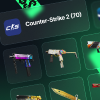After the recent victory of the squad Akuma at an RMR tournament, the topic of cheating has been raised once again in the Counter-Strike: Global Offensive community. The CS.MONEY blog is here to join the discussion and tell you everything about cheats in esports.

Important! We don’t accuse team Akuma of foul play and oppose any “witch hunt.” Our mission is to tell you why cheats still exist and what should be done about it.
What are cheats?
Let’s start from the beginning. Cheats are special programs that give you an advantage in the game. These advantages can be different: from the ability to see through walls to full recoil compensation. Just imagine: you fire a burst of rounds with an AK-47, and there’s no recoil as such, all automatically compensated by the mouse software.
Cheat codes are an outlier here. For obvious reasons, they can’t be used in online games. If you’re a GTA fan, you must’ve wrought havoc in the city with the help of cheats for the sake of fun. Those into StarCraft must’ve accrued extra minerals to make missions in the campaigns easier. The main difference between cheats and cheat codes: the latter are embedded in the game by the developers themselves.

In Counter-Strike: Global Offensive, for example, there’s a command that removes recoil. But it can’t be used without the sv_cheats 1 command — what a shame. You’ll remember, of course, that the sv_cheats command always has a value of 0 in competitive games.
Why is it impossible to defeat cheaters?
Online game developers and cheaters are engaged in a never-ending arms race, where a victory is fundamentally impossible. A number of methods are used to deter dishonest players. In Battlefield, for instance, cheaters are caught by tracing anomalies in the stats. In the vast majority of cases, a player with a K/D of 50 is a cheater.
TrackMania saw a scandal concerning dishonest players very recently. It turned out that some record-breaking players had deliberately slowed down the game to pass the race flawlessly. It was revealed after an analysis of the demos with anomalous “change of direction” values. Just like with Battlefield, this method doesn’t provide a 100% guarantee of catching the cheater — it only helps to find deviations in the statistics. Usually, they are indeed caused by dishonest players, but not always.
In esports, everything’s more complicated. It’s extremely difficult to catch cheaters based on statistics alone, unless we’re talking about the most brazen cases. For example, the trainer bug was used secretly for entire months until the community finally noticed it. Dozens of matches were compromised, although it seemed that the cheaters were simply well-prepared during the actual game.


Would you rather get another lottery spam or an informative news about CS:GO?
Subscribe to us. Give your mailbox a chance.

Cheats can also be traced with special software, but it doesn’t guarantee a result either. Valve has a VAC, which is notoriously slow. But it’s hard to blame the company: since a VAC ban is irreversible, accidental triggers must be excluded by the algorithm.
What do we do?
Two years ago, Kristoffer “faken” Andersson was caught cheating during a broadcast. The viewers saw signs of cheating in the reflection on his glasses. This sounds like a plot for another CSI: Miami episode, but the precedent suggests a great strategy to beat cheating in esports.
While the ability to play remotely is one of the advantages of virtual competition, it also creates one of the largest problems: lack of control. In regular sports, athletes are always supervised by judges and referees. They have to pass a doping test, and any outside help is immediately conspicuous. In esports, it’s the online element that gives room for cheating.
An outside observer can help fix this. Players have already started using cameras at broadcasts. Installing a second camera behind the player will allow the observer to control the gameplay and prevent the vast majority of cheats. It’s an expensive method though: in addition to cameras for players, the organizers themselves will have to finalize the infrastructure.
Yet there’s no other way as of now. If cameras and observers were already used at tournaments today, then rumors around Akuma’s success might not have arisen at all. Maybe it’s time for the big tournaments to revise their rules and introduce new measures against cheaters.









